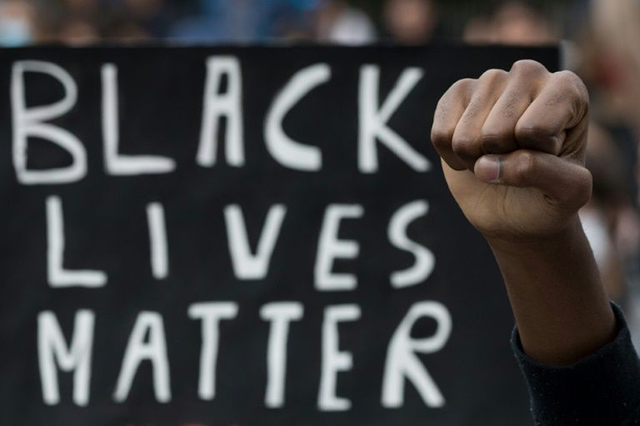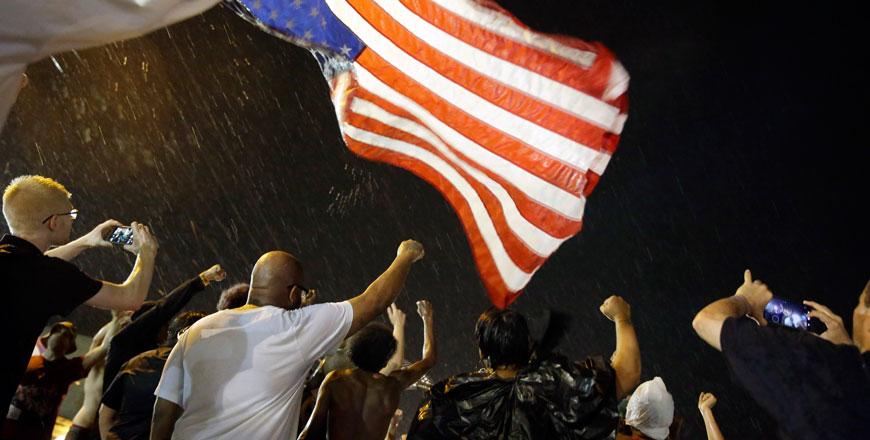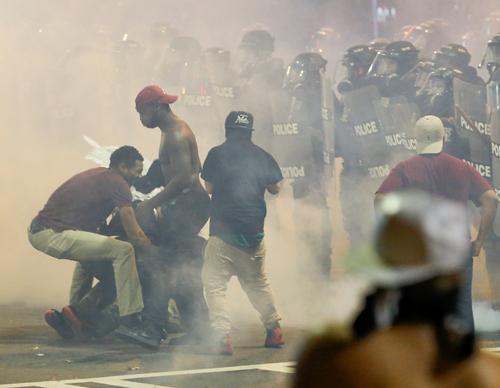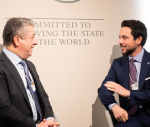You are here
French MPs tackle controversial clampdown on filming police
By AFP - Nov 18,2020 - Last updated at Nov 18,2020
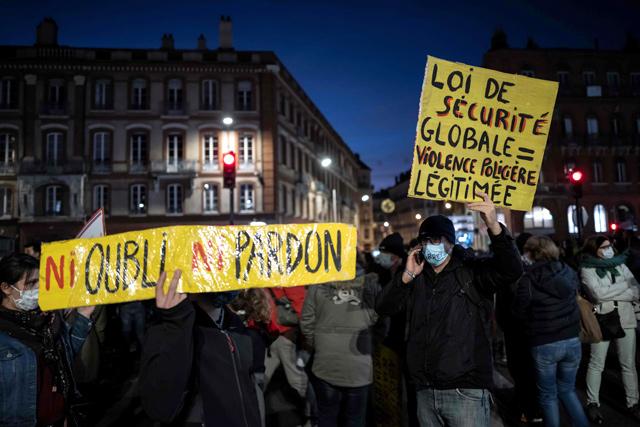
Protesters hold signs reading ‘Neither forgotten nor forgiven’ and ‘Overall security law = legitimised police violence’ during a demonstration on Tuesday in Toulouse, south-western France (AFP photo)
PARIS — The publication of police officers' faces unless blurred could become illegal in France, under legislation debated in parliament Tuesday and which critics say risks discouraging attempts to document abuses of authority.
France's security forces have long faced accusations of using brutal tactics when dealing with protesters, but also when confronting or arresting individuals, in particular from black or Arab minorities.
A series of incidents caught on video and spread on social media have spurred calls for reform, which gained momentum this year with the "Black Lives Matter" movement in the US following the death of George Floyd.
But police say they are increasingly under personal threat as they struggle to carry out President Emmanuel Macron's promise to reduce crime and insecurity, especially in the rough housing blocks surrounding Paris and other cities.
An attack on a police station outside Paris last month, by dozens of people armed with fireworks and steel bars, galvanised the government to vow concrete measures to protect officers and improve working conditions.
A new "comprehensive security" law from Macron's centrist government proposes reforms such as giving more autonomy to local police — and potentially arming more of them — and expanding the use of surveillance drones in high-crime areas.
But last month, his right-wing Interior Minister Gerald Darmanin supported a measure long sought by police unions, making it a crime to show images of an officer's face unless it has been made blurry.
Publication on social media or elsewhere with the intent of undermining an officer's "physical or psychological integrity" could be punished by a year in prison or fines of up to 45,000 euros ($53,000).
'War of images'
Darmanin says the measure would "protect those who are protecting us," especially in poor neighbourhoods where tensions often run high between law enforcement and immigrant communities.
The law's co-author Jean-Michel Fauvergue, a former head of France's elite RAID police unit, rejected claims that police were getting new protections from criticism.
"In no way does this stop journalists from working," Fauvergue said at a press conference on Tuesday.
He said the law would only punish publication of an officer's face "with messages calling for hate or violence".
Journalists and rights activists are not convinced, saying the stricter rules would effectively work as a "gag law", similar to a measure in force in Spain since 2015, that would hinder attempts to hold police accountable.
An open letter this month signed by journalists across France, including some from Agence France-Presse, urged lawmakers to reject the new image limits, and protests have been called for outside parliament on Tuesday.
"There's reason to fear that officers who already often try to prevent filming or photographs of their interventions in public areas, including through the use of force — despite it being perfectly legal — will feel even more empowered to do so," they wrote.
A letter from The UN Human Rights Council this month also warned French authorities the proposal "could discourage, even punish those who could supply elements of potential human rights violations by law enforcement, and provide a sort of immunity".
Critics point in particular to the hundreds of violence complaints filed against officers during the "yellow vest" anti-government rallies that erupted in 2018, which saw fierce clashes between protesters and police that made headlines worldwide.
In July, three officers were charged with manslaughter over the death of a delivery man, Cedric Chouviat, who was filmed by bystanders as officers had him in a chokehold after his arrest for a traffic offence in Paris.
Chouviat said "I'm suffocating" seven times before his body went limp.
"Black Lives Matter" also fuelled mass protests this summer against alleged police violence in France, particularly over the 2016 death in custody of a 24-year-old black man, Adama Traore.
Medical experts have exonerated the officers who arrested Traore, but his family has contested the findings, saying he was a victim of choking.
France's human rights auditor has also warned of "considerable risks" from the new law, saying it "must not impede on freedom of the press, nor on freedom of information".
"The publication of images regarding police interventions are legitimate and necessary for a democracy to function," the Defenseur des Droits said.
Related Articles
PARIS — Three French police members have been charged with manslaughter over the asphyxiation death of a delivery man who was pinned to the
FERGUSON, Missouri — A man was critically wounded in a gun battle with police as street protests turned violent in Ferguson, Missouri, on Su
CHARLOTTE, N.C.— Police in Charlotte do not plan for now to release a video showing the fatal shooting of a black man by officers that has sparked two nights of violent protests in North Carolina's largest city, the department's chief said on Thursday.


